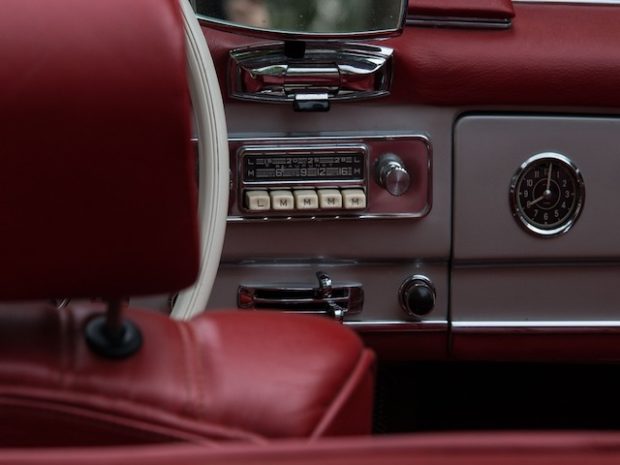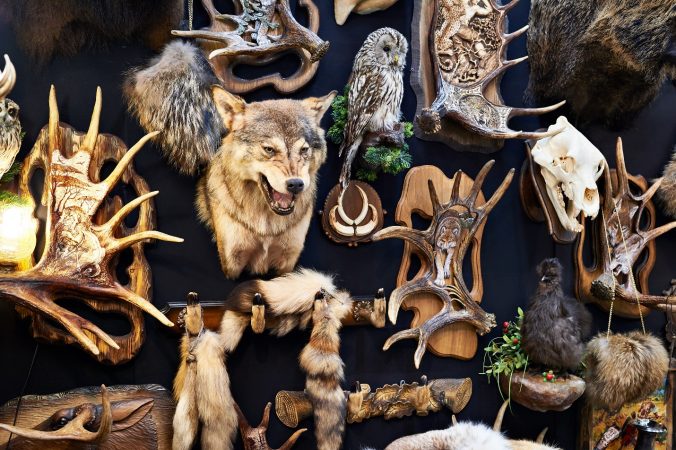You have no items in your cart. Want to get some nice things?
Go shopping
One of my earliest memories involves music. I was four years old at the time – 1973, the halcyon days before seatbelt laws and helicopter parenting. I was standing up in the front seat of our white Rambler, hanging over the headrest, jabbering with my older brother Steve while our mother chauffeured us around our small Southern town, the FM station playing Pop and Rock songs.
“Christy, turn around and settle down,” Mom insisted. Having only learned to drive a couple of years prior, she was creeping along at an old-lady speed, concentrating, still unsure of herself behind the wheel of a two-ton machine with shiny chrome headlights my dad had meticulously waxed and buffed.
Just then, “Whole Lotta Love” exploded on the radio. I clutched the headrest and bounced up and down on the seat. “Wanna whole lotta love,” I screeched, probably in the same octave as Robert Plant. “Wanna whole lotta love.”
“Christy!” Mom was desperate. “Sit down!”
I rocked back and forth, still holding onto the headrest, singing those lyrics, whether it was the chorus or verse or that freaky middle part with the wailing and ah ah ah ahs, completely entranced by Jimmy Page’s iconic guitar riff – far more so than Robert Plant’s libidinous vocals. Steve, ten years my senior, sat in the backseat and cackled. Mom begged me to hush and sit down. But I kept right on singing, brazen, fearless, mesmerized by a guitar virtuoso whose name and face I did not yet know: “Wanna whole lotta love.”
“That never happened,” my brother said recently.
I sucked my teeth, as only a petulant younger sister can, even a middle-aged one. “Of course it did,” I snapped.
“Nope, I’d remember something like that.”
We were at loggerheads – my memory pitted against his – locked in a puerile battle of he said she said without our mom to mediate, as she’d died of cancer over fifteen years ago. I flashed back to that integral moment of my childhood, the sound of Jimmy Page’s Les Paul pealing from the crude radio speakers like an oracle from the Rock and Roll gods. How could I misremember that kind of magic, that surge of energy? How could I possibly misremember the transformational power of Jimmy Page?
“You must have imagined it,” Steve maintained, “because I’m certain it never happened.”
I heaved a resolute sigh. “Well, then,” I said, “it should have.”
In my mind it did, exactly as I retold it, how I will always retell it. There is no other version that makes sense. All of the pieces, including the cast of characters, fit together like prophesy. They all lead to a sultry summer day in 1985, when I was fifteen years old – a moment that my brother does not dispute, a moment that changed my life.
Mom and I had just returned from Sunday school to find Steve sprawled on our living-room couch, engrossed in an MTV broadcast of Led Zeppelin’s 1976 concert movie, The Song Remains the Same. Steve loved the band. He played drums in various groups around town and idolized Zeppelin’s drummer, John Bonham, arguably the best percussionist in the history of Rock. Steve even bore a slight resemblance to Bonzo, Bonham’s nom de guerre, with his long dark hair, mustache, and probing eyes. Because Steve was part of the local Rock scene and exuded an aloof coolness that inspired my admiration, I respected his musical taste and tried to adopt it, even when I secretly preferred the more poetic verse of Bob Dylan to the inane posturing of Ted Nugent. So on that pivotal early July morning, I followed the eerie bass line of “Dazed and Confused” from the back door to the living room and plopped on the floor in front of the TV to watch the film with him.
“Which one’s Led?” I asked, grabbing a handful of popcorn from the bowl on his lap.
He rolled his eyes. “Which one’s Jethro Tull?”
I didn’t know that either. But I did know that the guy dressed in an esoteric black satin getup was exquisite. I’d seen a picture of him in The Song Remains the Same movie poster hanging in my brother’s room, but the image was minuscule and grainy. I’d never paid it any mind. Now he was in living, pulsing color, gliding across the stage like a dark angel wielding an electric guitar.
“He’s beautiful,” I blurted.
Steve snorted and pelted me with a sofa pillow. “He’s old enough to be your great-granddaddy.”
He didn’t look old enough to be anyone’s great-granddaddy in the movie, though, most of which had been filmed at Madison Square Garden in 1973. He was beautiful, ethereal, with wavy dark hair that grazed his shoulders and a pre-Raphaelite face, like the ones I’d seen in a school textbook. He was a wizard, manipulating invisible energy around the Theremin in “No Quarter,” beguiling a doubleneck guitar in “Stairway to Heaven,” black shirt open in the front, stars and half moons on black pants, cryptic silver pendant dangling from his neck. I gazed at him, unsettled, my insides churning, and watched him tear through one song after another with a febrile zeal that belied his delicate features. The contradiction fascinated me. As did his “Dazed and Confused” fantasy sequence. A roadie hands Jimmy a violin bow from the shadowy wings of the stage. He stands alone under a spotlight and strokes the bow across the strings of his Les Paul. Slow, sensual, like a seduction. The scene shifts from Madison Square Garden to a blustery moonlit night in the Scottish Highlands. An ascot-clad Jimmy climbs a mountain. An old man, the mythical Hermit from the Tarot, stands alone at the crest, ominous music droning in the background. Jimmy reaches for the old man, who morphs into Jimmy himself, clad in a hooded gray robe, lantern in one hand, violin bow in the other. He sweeps it overheard like a saber while the scene fades back to Madison Square Garden – Jimmy in a halo of white light, back arched, bow commanding guitar strings. Intense, fast. Robert Plant’s voice, a plaintive wail, in sync with the music. At the climax, Jimmy tosses the shredded bow into the audience like a discarded lover then launches into a blistering solo.
I glanced at my mom and blushed.
She’d changed from her church clothes into slacks and a sweater and sat on the piano bench watching the movie with us, snickering every time Robert Plant thrust his crotch at the mic stand. She was a stoic lady by nature, who, at fifty-two, was much older than the mothers of most of my friends. Like many women of her generation – the generation Betty Friedan spoke of in The Feminine Mystique – her concept of propriety tended toward the conservative. Every night she pin-curled her short hair and sprayed it into a salt-and-pepper helmet a stage-four hurricane couldn’t move. She considered pierced ears vulgar. Pressed powder and lipstick were the sole ingredients in her makeup repertoire. She insisted I attend Sunday school every week, although she volunteered in the church nursery while I endured banal lectures on the evils of premarital sex and Rock bands like Led Zeppelin. Unlike my father, from whom she’d been divorced since I was seven, she indulged my protean obsessions – from Judy Garland musicals to S. E. Hinton’s YA novel The Outsiders to my teenage acting and singing aspirations, and now this raucous band with an enigmatic guitarist who bewitched the crowd with the single stroke of a violin bow on unsuspecting guitar strings.
I leaned back against the recliner and hugged my knees to my chest. I felt hazy, like I had on the painkillers my dental surgeon gave me following my wisdom teeth extraction when I was thirteen, right before I got braces. It was as if a door had yawned open inside me, mystical and dreamy. One that had been locked my whole life.
I was beginning the transition from junior high to high school, and I’d grown bored with my friends’ pedestrian interests: Friday night jaunts to the mall to scope out cute boys, school pep rallies, church youth-group hayrides. I felt like a gum-smacking teenage cliché. I was searching for something that tapped into my dormant dark corners and, as such, legitimized my feelings of alienation and my desire to escape eastern North Carolina conventionality. Not that I had any interest in selling my soul to the devil, as I’d heard Led Zeppelin had done, or dabbling in black magic, which was a rumored avocation of Jimmy Page’s, a rumor nurtured by the man himself at the beginning of The Song Remains the Same when a bicycle messenger approaches him to deliver the group’s tour dates and Jimmy stares at him with bubbling red eyes. I’d become enraptured by the forbidden, the apple my Sunday school teachers and youth pastor warned me not to bite. I didn’t know it then, but I had been waiting for the likes of Led Zeppelin and Mr. Page for a long, lonely time.
I pointed to the remote control in my brother’s hand. “Turn it up,” I said. He punched the volume button until the TV speaker rattled and the thump of John Bonham’s drums vibrated in my chest.
Mom pressed her hands over her ears dramatically. “Turn it down!” she bellowed.
Steve reluctantly lowered the volume and handed me what was left of the popcorn. He pulled the cream-colored afghan our grandmother had crocheted over his faded Levis and clasped his hands behind his head.
“Are they still together?” I asked, my eyes flitting from the TV to my brother. “I mean, do they still play concerts?”
He reached over and mussed my hair. “Good god, I’ve created a monster.”
I whipped off my headband and combed my fingers through my hair, which looked remarkably like Jimmy’s, except his was thicker with a bit more wave. “Well, do they?”
He shook his head. “The drummer died about five years ago.”
I studied Bonzo’s face as he played. He looked as if he were shouting in time with the beats. He was so alive, so corporeal. How is it that we’re here one minute – neurotransmitters firing through synapses, one impulse triggering another – and gone the next, I thought. The act of dying, in spite of the benign way my biology teacher had explained the process, terrified me.
When I was five, a little friend and I decided it would be great fun to smash an empty Coke bottle with a hammer on my patio. At my first swing, a sliver of glass flew up and cut my left cornea. After a couple of surgeries, my parents sent me back to nursery school with a big bulging patch on my eye, and, according to my mom, my personality took a one hundred-eighty-degree turn from precocious extrovert to brooding introvert. That experience, along with a soon-to-follow ill-fated joy ride on my new Banana bike that resulted in further punishment to the left side of my face and, a couple of years after that, a broken left wrist sustained during an unfortunate game of Red Rover, left me with a preternatural fear of death.
“What happened to the drummer?” I asked Steve.
“Got drunk and choked on his own vomit – at Jimmy Page’s house,” he said in his campy Vincent Price imitation. “They say you could see smoke shooting from an open window where Jimmy was probably sacrificing a live chicken.”
I clucked my tongue. “That’s bullshit.”
Mom gave me one of her how did I raise such a foul-mouth daughter sighs then ordered me into the kitchen to help her fix lunch.
“The movie’s not over yet,” I protested.
“MTV’s playing it again tonight,” Steve said. “You can watch it then if you want.”
I did. Mom set up her ironing board in the living room and endured another two hours of Robert Plant’s mic-humping with me. She listened patiently while I blathered on about a particular riff Jimmy played or nagged her to pay attention to the way he switched effortlessly from the six- to the twelve-string of his doubleneck during “The Rain Song” or gushed at his Rock God leap during “Rock And Roll.” I’m sure she was girding her loins for a long winter’s crush. She got much more than she bargained for.
“Admit it, Mom,” I said at the end of the movie, the band ensconced on their airplane, about to take flight. “They’re good.”
“They’re loud, I’ll say that for them.”
She hung her freshly pressed blouses in the closet then clicked off the TV and floor lamp by the piano. The amber glow of the bathroom nightlight spilled into the darkened living room. I rubbed my eyes and padded down the hall in my sock feet to Steve’s empty bedroom, which, at twenty-five, he still occupied. I stood in the doorway and stared at The Song Remains the Same movie poster stapled to his wall. Before long, my yellow bedroom walls would be covered with Led Zeppelin posters. I would scribble Zoso, the symbol Jimmy gave himself for Led Zeppelin’s untitled fourth album, on my ratty old jeans in black magic marker and insist Steve copy his Zeppelin albums on cassette so I could listen to them on my Walkman. He had them all, from the first record to Coda. I would spend hours holed up in my room listening to those albums, struggling to figure out where “that confounded bridge” Robert mentioned in “The Crunge” went and why Gollum and the Evil Lord had the temerity to “[creep] up and slip away with her” in “Ramble On.” I’d torture my mom with relentless trivia: “Did you know that Jimmy used to play in the same group as Eric Clapton and Jeff Beck?” (I had to track down a Yardbirds album after that discovery.) “That was Bonzo’s little kid Jason playing drums in the ‘Moby Dick’ fantasy sequence in The Song Remains the Same.” “John Baldwin is John Paul Jones’ real name.” “Robert once studied to be an accountant.” I would learn as much about them as a teenage girl could in the pre-Internet 1980s.
The band – Jimmy – would become my religion.
I closed Steve’s door and shimmied to my room, “Whole Lotta Love” thrumming in my head. I ferreted a clean nightshirt from the mound of freshly washed laundry I’d dumped on the floor of my closet then opened Steve’s copy of Hammer of the Gods, music journalistStephen Davis’ much-maligned biography of the band. He’d loaned it to me before leaving to join some friends for a night of barhopping downtown, and I’d spent the interim between the first and second showings of the movie thumbing through the pages, devouring the salacious parts about the band’s antics on tour, some of which involved TV sets flying from hotel balconies and stoned groupies who were barely older than me. I’d once pushed over our Christmas tree in an act of childhood defiance, but I’d never progressed to the level of juvenile delinquent. The closest I’d ever come to drugs was when I hid Steve’s baggie of pot underneath the sofa cushions after he’d passed out one night, in an effort to spare him another diatribe on the dangers of Mary Jane from Mom, who’d taken Reefer Madness a little too literally. But the parts of the book that were the most beguiling were those about Jimmy’s fascination with the late nineteenth-early twentieth century occultist Aleister Crowley. A lot of it was too recondite for me to grasp at that time, but I understood enough to be spooked and utterly hooked on the band and especially Jimmy.
I switched off the light and crawled into bed. The streetlight across the road illuminated the bare walls where my posters would soon be. I tried to imagine what a twenty-by-thirty-inch close-up of Jimmy Page’s face would look like peering down at me from above my stereo, watching me undress every night in the gauzy glow of my white whicker lamp. The thought of it sent a tantalizing shudder through parts of my body that were just as foreign to me at that time as Led Zeppelin had been a mere twenty-four hours ago.
I gazed out the window at the knotty pine trees in our front yard. They reminded me of an arthritic old man, grizzled and grim, lonely in the muggy summer night. I pictured Aleister Crowley and a cadre of sycophants dressed in ceremonial robes dancing around the trees to “Dazed and Confused” or “No Quarter,” invoking tenebrous spirits, Jimmy Page ever vigilant from afar. I wasn’t sure I wanted to include him in the dancing part of my reverie. He was far too cool for that. Plus, I didn’t want him to be too dangerous.
Mom tapped on my door then breezed inside, the canvas soles of her slippers clip-clipping on the hardwood floor. “Just wanted to say goodnight,” she said. That was our ritual: I’d fall into bed, turn off the light, and wait for her to kiss me goodnight. I was still a child, teetering on the edge of adulthood, eager, yet afraid, to fly. I was looking for epiphany and truth, and the freedom I thought that would bring. I was also looking for mystery and passion. The religion of my youth had ceased to fill either need, but I wasn’t ready to totally jettison my beliefs. Instead, I clung to them, my grip becoming more and more tenuous.
“Mom,” I said, a whisper of hesitation in my voice. “Will you sing that Jesus song to me?” She sat next to me on the bed and grinned, her crooked front teeth gleaming in the stray light. I laced my fingers through hers and squeezed. “Come on, Mom. I wanna hear it.”
She began to sing sotto voce, as though to raise her voice would be to violate the stillness of the night:
When Jesus was a little boy
he had his work to do.
He helped his mother in the house
and worked for father, too.
And when his work was finished
he ran out in the sun.
He played with all the boys and girls
’til evening time had come.
Then Jesus and his family
would climb the stairs to see
the moon and stars up in the sky
as pretty as can be.
For years after my eye injury, I was haunted by nightmares that would jolt me awake in the wee hours of the morning, panic rippling in my voice. Mom would sing the Jesus song to me to lull me back to sleep, rocking me in the yellow chair with black ink stains on the arms, remnants of the newspapers Steve rolled at the crack of dawn for his paper route. She’d croon the lyrics until I’d drift off on her gentle timbre, visions of a little boy and his family staring at the moon and stars from the roof of their house.
Mom kissed my forehead and tucked the covers around me. “Sleep tight,” she said, then clip-clipped into the bathroom to pin curl her hair, the scent of her favorite Jergins lotion lingering in my room.
I closed my eyes and thought of Jimmy standing on a stage at Madison Square Garden in 1973. Twenty-nine-year-old Jimmy Page, unleashing a sacred power I knew had already changed me. His music would bring solace during my tumultuous teenage years, my divorce from my first husband in my thirties, and the death of my second in my forties. It would see my brother and me through my mother’s illness and the grief that crippled me for years after she died, soothing me when scenes of her final moments crept into my sleep, offering epiphany and truth, mystery and passion – then and now, but especially on that summer night in 1985, while I lay in bed in the shadows of my darkened room, the vision of the man who would become a constant in my life peering down at me from my yellow bedroom walls.

About Christy Hallberg
Christy Alexander Hallberg is a Teaching Professor of English at East Carolina University, where she earned her BS and MA in English. She received her MFA in Creative Writing from Goddard College. In addition to her teaching duties, she is Senior Associate Editor for North Carolina Literary Review. She has published short stories and creative nonfiction with Rock music themes in such journals as Main Street Rag, Fiction Southeast, Riggwelter, Eclectica, Solidago, STORGY Magazine, and Concho River Review. Her first novel, Searching for Jimmy Page, is forthcoming from Livingston Press.




